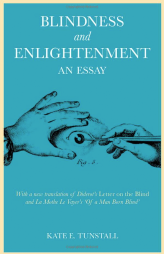Université Paris-Sorbonne(Paris-IV) Agence Nationale de la Recherche
Blindness and Enlightenment: An Essay
With a New Translation of Diderot's Letter on the Blind and La Mothe Le Vayer's 'Of a Man Born Blind'
par Kate Tunstall
Paperback : 250 pages
Editeur: Continuum
Langue: Anglais
Date: Août 2011
ISBN: 1441119329
Format: 13.8 x 1.8 x 21.6 cm
Book description
This is a new reading and translation, the first into English since the eighteenth-century, of Diderot's "Letter on the Blind for Use by the Sighted". "Blindness and Enlightenment" presents a reading and translation of Diderot's "Letter on the Blind for Use by the Sighted" (the first translation into English since the eighteenth-century). Diderot was the founder and editor of the "Encyclopedie", a novelist, a philosopher and an active proponent of democratic ideals. His "Letter on the Blind" is essential reading for anyone interested in Enlightenment philosophy or eighteenth-century literature. By discussing the blind, Diderot undercuts a central assumption of the Enlightenment, present in the very term itself in its reference to 'light', namely that moral and philosophical insight was dependent on seeing.
Table of contents
List of Figures appearing in the Essay; Acknowledgements; Note on the References; Prologue, or Operation Enlightenment; Recognition Scenes; Misrecognition Scenes; Scene Unseen; Introduction: Optics and Tactics; ***, or the Letter-Writer Formerly Known as Diderot; Wider Focus and Closer Up; Blind Man's Buff; The Epigram; One: Reading is Believing?; The Man-Born-Blind of Puiseaux; Blind Men and Bonnets; Saunderson; Two: The Blind Leading the Blind Leading the Blind Leading the Blind Leading the Blind...; Molyneux's Man-Born-Blind; A Comic Type; Sextus Empiricus's Man who Sees and Hears Nothing; Montaigne's Gentleman of a Good House, Born Blind; Descartes's Analogy; Gassendi's Man-Born-Blind; La Mothe Le Vayer's Man-Born-Blind; Three: Point of View and Point de Vue; Reflections and Refractions; Morally Blind. Blind Vanity; Optics and Phatics; Blind Metaphysics; See and Tell; Four: Grouping Around in the Light; Imagination and Memory; Touch and Drawing; An English Geometer's Ingenious Expression; Staying in Touch; Felicitous Expressions; Five: A Supplement to Saunderson's Memoirs; An Omission; A Conversation of the Existence of God; An Epicurean Vision; Last Words; Six: Dis/Solving Molyneux's Problem; The Prussian's Girl-Born-Blind; A Painful Operation; Trained Eyes; Seeing the Light; It Depends; Conclusion, or Two Hours Later...; Bibliography; Index; Appendices; I. Denis Diderot, The Letter on the Blind for the Use of Those Who Can See (1749); Note on the Translation; Translation; II. Francois de La Mothe Le Vayer, 'Of a Man-Born-Blind' (1653); Note on the Translation; Translation.

